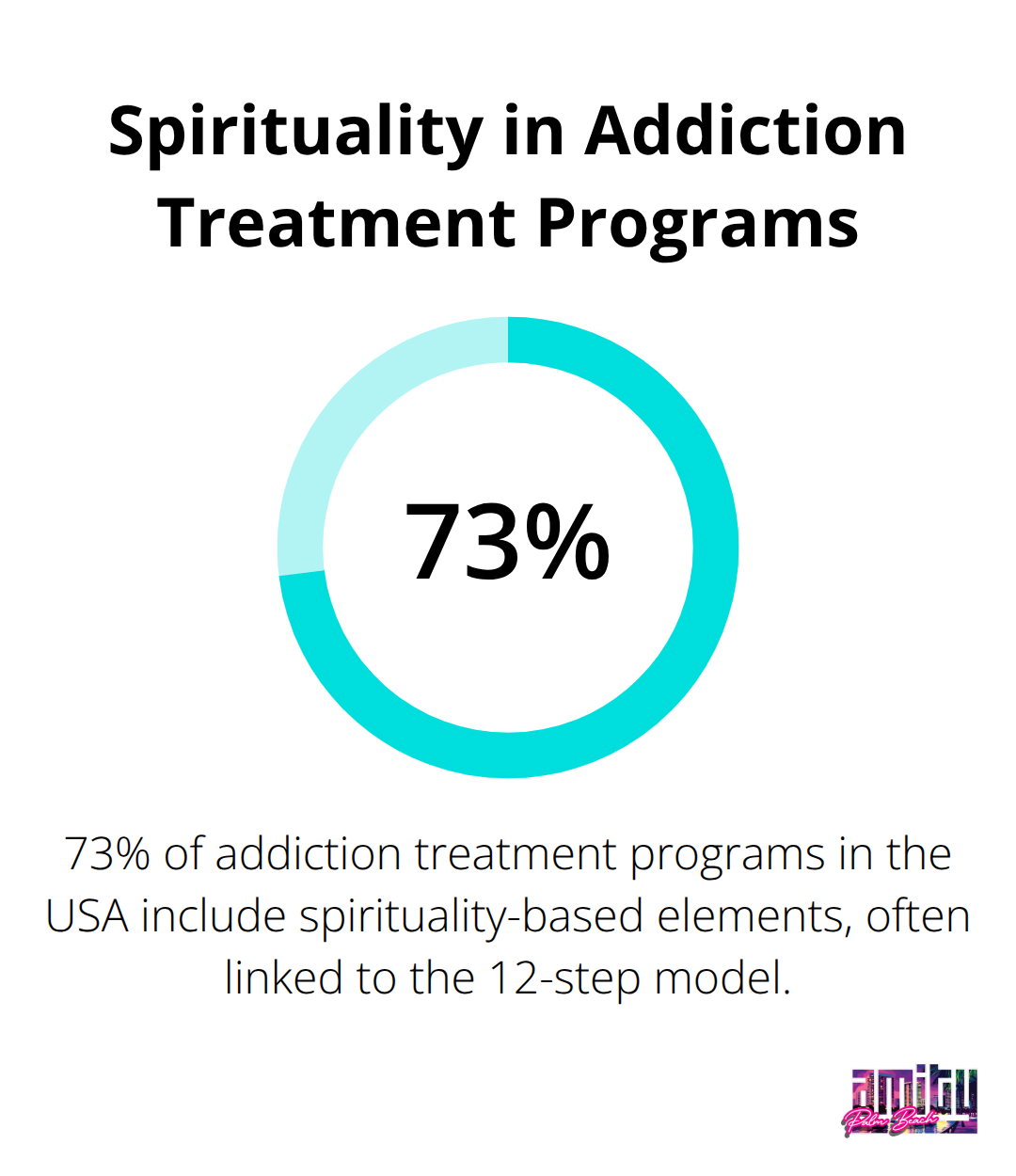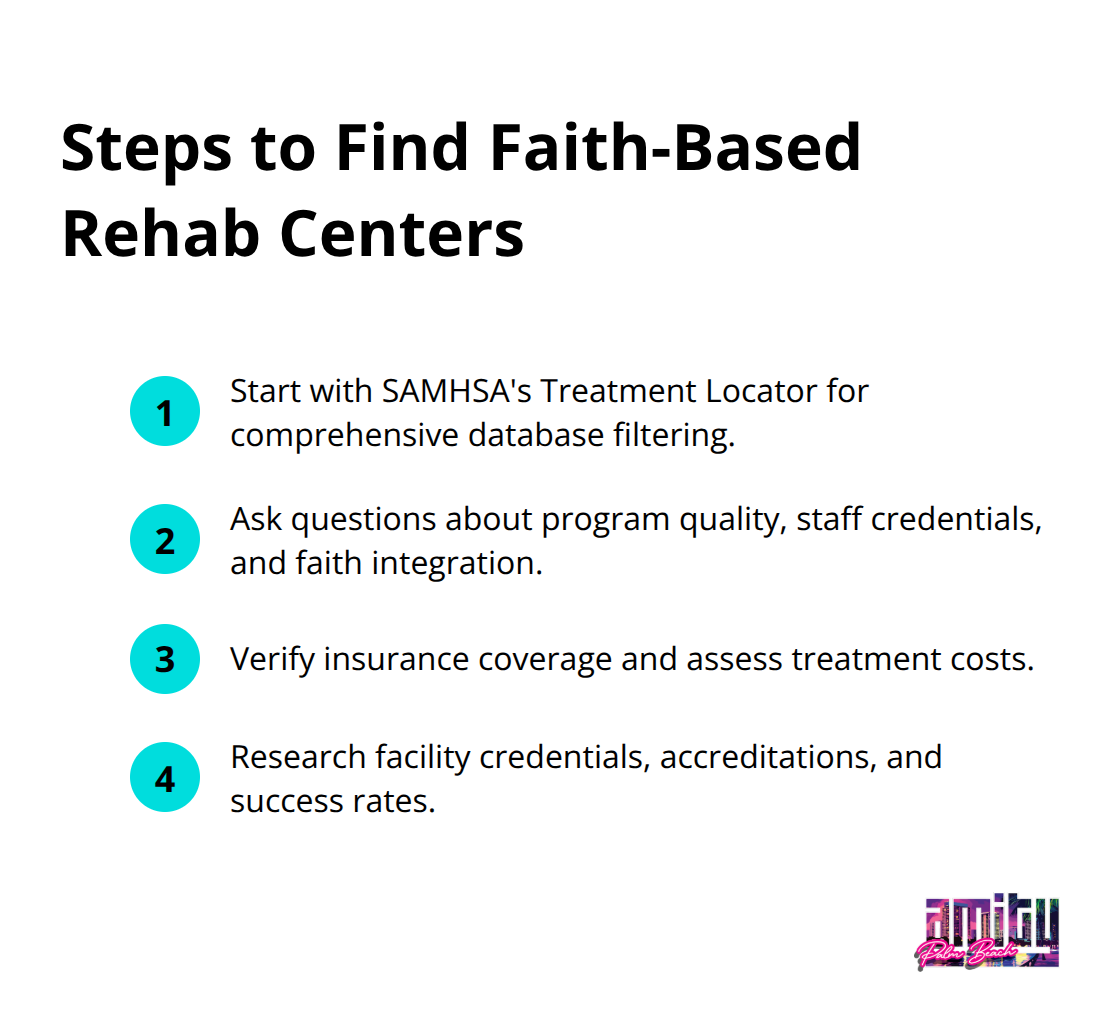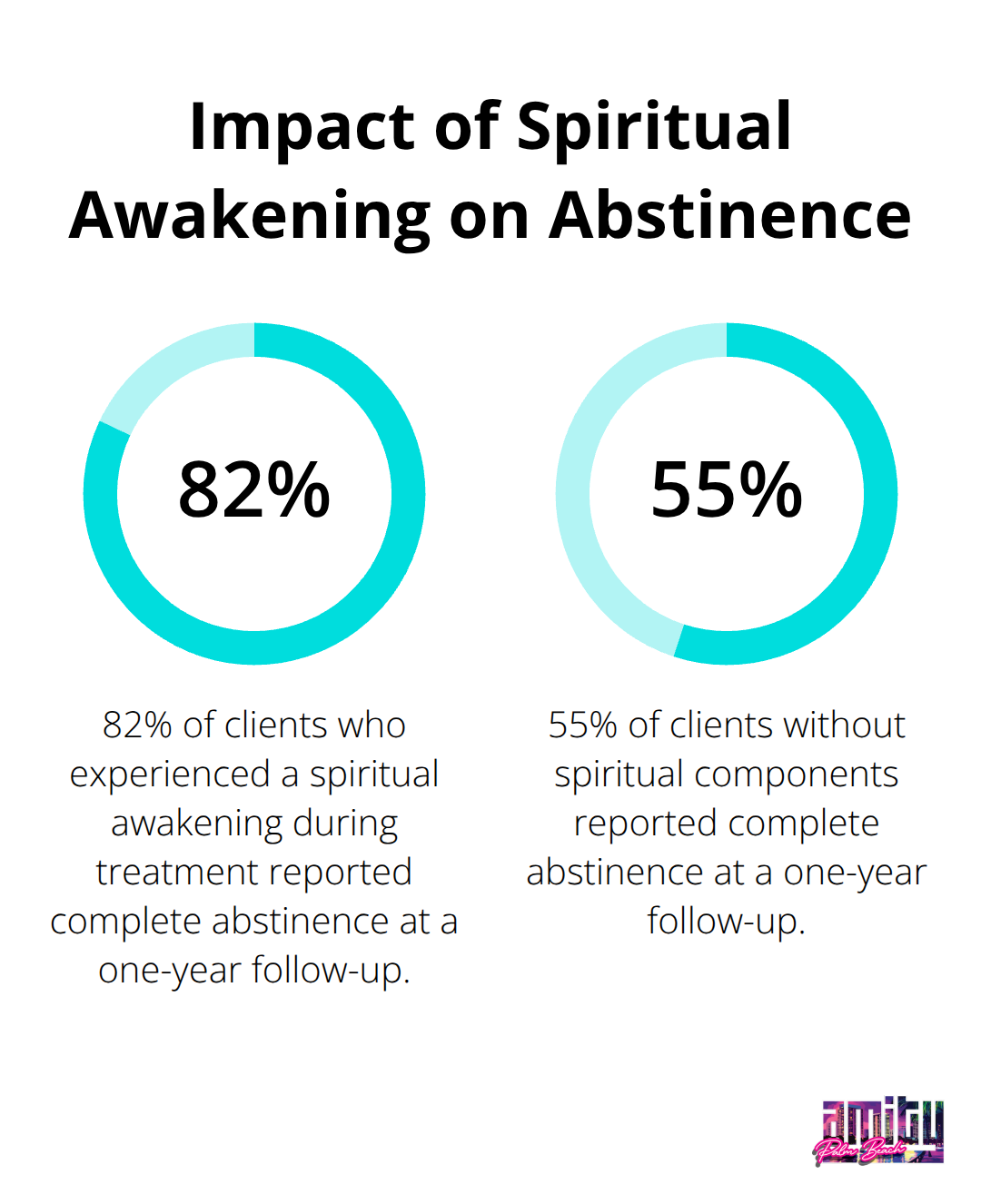Finding faith-based rehab centers near me can feel overwhelming when you’re ready to take the first step toward recovery. Many people want treatment that honors their spiritual beliefs while providing professional addiction care.
We at Amity Palm Beach understand that faith can be a powerful foundation for healing. This guide will help you locate quality programs that combine evidence-based treatment with spiritual support in your area.
Understanding Faith-Based Rehabilitation Programs
Faith-based rehabilitation programs operate on the principle that addiction stems from spiritual emptiness and disconnection from a higher power. These programs view recovery as both a medical and spiritual journey, where healing requires attention to the soul alongside the mind and body. Research by Grim & Grim shows that 73% of addiction treatment programs in the USA include spirituality-based elements, often linked to the 12-step model that Alcoholics Anonymous popularized. The core philosophy recognizes that sustainable recovery requires rebuilding one’s relationship with faith while simultaneously addressing the physical and psychological aspects of addiction.

Clinical Excellence Meets Spiritual Guidance
Modern faith-based centers combine evidence-based therapies like cognitive-behavioral therapy with spiritual practices such as prayer, meditation, and scripture study. This integration creates a comprehensive treatment approach where licensed clinicians work alongside chaplains and spiritual counselors. Studies show that 82% of clients who experienced a spiritual awakening during treatment reported complete abstinence at a one-year follow-up (compared to 55% without spiritual components). The most effective programs maintain strict clinical standards while they incorporate daily devotions, faith-based group therapy sessions, and pastoral counseling into their treatment protocols.
Denominational Approaches and Program Variations
Christian-based programs dominate the faith-based treatment landscape, with organizations like Celebrate Recovery operating over 500 ministries across the United States. Jewish facilities work through networks like the Jewish Addiction Awareness Network, while Buddhist-inspired programs like Refuge Recovery apply the Four Noble Truths to addiction recovery. Catholic Charities operates over 160 agencies that provide addiction support, and The Salvation Army offers work therapy combined with spiritual direction. Each denominational approach maintains its theological framework while it meets state licensing requirements and accreditation standards for addiction treatment.
Treatment Philosophy and Core Principles
Faith-based programs address addiction as both a disease and a spiritual crisis that requires divine intervention alongside medical treatment. These centers emphasize personal responsibility, moral inventory, and surrender to a higher power as fundamental steps in recovery. Many programs incorporate the belief that addiction represents a form of spiritual warfare, where individuals must rebuild their relationship with God or their chosen higher power to achieve lasting sobriety. This philosophy shapes every aspect of treatment, from individual counseling sessions to group activities and aftercare planning.
Now that you understand what makes faith-based treatment unique, the next step involves locating quality programs in your area that match your specific spiritual beliefs and treatment needs.
How to Find Faith-Based Rehab Centers Near You
Start with SAMHSA’s Treatment Locator
The SAMHSA Treatment Locator provides your most reliable starting point, with a comprehensive database that filters results by faith-based programs, insurance acceptance, and location. This government-backed tool connects you directly with verified facilities that meet federal standards. Faith-based organizations like Celebrate Recovery maintain their own directory systems, while denominational networks such as Catholic Charities and The Salvation Army provide specialized locator services for their affiliated programs. Insurance company websites often feature enhanced search functions that identify in-network faith-based providers (potentially saving thousands in out-of-pocket costs).

Questions That Reveal Program Quality
Contact potential facilities with specific inquiries about their clinical staff credentials, state licensing status, and accreditation from organizations like The Joint Commission or CARF. Ask about their staff-to-client ratios, average length of stay, and specific faith traditions they accommodate. Programs that cannot provide clear answers about their success rates, aftercare plans, or dual diagnosis capabilities should raise immediate red flags. Request detailed information about their integration of spiritual practices with evidence-based therapies, as legitimate facilities will explain exactly how chaplains and licensed clinicians collaborate in treatment plans.
Insurance Verification and Cost Assessment
Most major insurance providers now cover faith-based treatment under mental health parity laws, but coverage varies significantly between plans and facilities. Contact your insurance company directly to verify benefits before you commit to any program, as some faith-based centers operate as out-of-network providers that require higher copayments. Programs that accept insurance typically offer free benefit verification services, while quality facilities provide transparent pricing for private pay options. Avoid centers that demand full payment upfront or cannot provide itemized cost breakdowns for their services.
Research Facility Credentials and Success Rates
Accredited faith-based centers maintain the same clinical standards as secular facilities while they incorporate spiritual elements into treatment protocols. Look for facilities with Joint Commission accreditation, state licensing, and board-certified medical staff (these credentials indicate legitimate treatment programs). Ask about their completion rates, one-year sobriety statistics, and specific outcome measures they track. Quality programs will share their success data openly and explain their methodology for measuring treatment effectiveness.
Once you identify potential programs that meet your spiritual and clinical needs, the next step involves evaluating how these faith-based approaches can benefit your specific recovery journey.
Benefits and Considerations of Faith-Based Treatment
Spiritual Support Creates Lasting Accountability
Faith-based programs establish accountability structures that secular facilities often cannot match, with peer support networks that extend far beyond treatment completion. Research from Grim & Grim demonstrates that clients who experienced spiritual awakening during treatment were completely abstinent at a 1-year follow-up compared with 55% of non-spiritually awakened clients. These programs build community connections through shared worship, prayer groups, and faith-based mentorship that continue after discharge. The Salvation Army reports that their work therapy programs, combined with spiritual direction, produce higher completion rates than traditional vocational rehabilitation alone.

Clinical Integration Delivers Comprehensive Care
Quality faith-based centers employ licensed clinicians who work directly with chaplains to create integrated treatment plans that address both psychological and spiritual needs. Celebrate Recovery’s 500+ ministries across the United States combine cognitive-behavioral therapy with scripture-based group sessions, while Catholic Charities’ 160 agencies provide dual diagnosis treatment alongside pastoral counseling. However, programs that prioritize prayer over medication-assisted treatment or discourage psychiatric medication create dangerous gaps in care. The most effective facilities maintain strict clinical protocols while they incorporate daily devotions (with medical directors who understand both addiction medicine and spiritual counseling approaches).
Personal Compatibility Determines Treatment Success
Faith-based treatment works best for individuals whose spiritual beliefs align closely with the program’s denominational approach, but creates barriers for those with different or questioning faith backgrounds. Programs that require participation in specific religious practices or biblical study may alienate clients from other traditions or those who explore spirituality. Some faith-based centers have limited experience with co-occurring disorders or may view mental health issues through primarily spiritual lenses rather than medical ones. Before you commit, assess whether the program’s theological framework supports your personal beliefs and whether their clinical staff includes board-certified psychiatrists and licensed therapists alongside spiritual counselors.
Evidence-Based Treatment Remains the Foundation
The most successful faith-based programs maintain rigorous clinical standards while they incorporate spiritual elements into evidence-based treatment protocols. These facilities employ board-certified addiction medicine physicians, licensed clinical social workers, and certified addiction counselors who collaborate with chaplains and spiritual directors. Programs that substitute prayer for proven medical interventions (such as medication-assisted treatment for opioid addiction) compromise client safety and recovery outcomes. Quality faith-based centers recognize that spiritual healing complements but never replaces professional medical and psychological treatment approaches.
Final Thoughts
You must evaluate clinical credentials, denominational alignment, and treatment philosophy when you select faith-based rehab centers near me. The most effective programs combine licensed medical professionals with spiritual counselors while they maintain accreditation from organizations like The Joint Commission. Your chosen facility should share success rates transparently, provide clear insurance verification, and demonstrate how they integrate evidence-based therapies with spiritual practices.
You take the first step toward recovery when you contact facilities that match your spiritual beliefs and clinical needs. Quality faith-based programs will conduct free assessments, verify your insurance benefits, and explain their treatment approach without pressure tactics. The SAMHSA Treatment Locator remains your most reliable resource, while denominational networks like Catholic Charities and Celebrate Recovery offer specialized support.
We at Amity Palm Beach provide comprehensive addiction treatment that combines medical supervision with compassionate care in supportive environments. Contact SAMHSA’s National Helpline at 1-800-662-4357 for 24/7 confidential support and treatment referrals (this service connects you with local resources immediately). Professional help remains available when you need it most.




